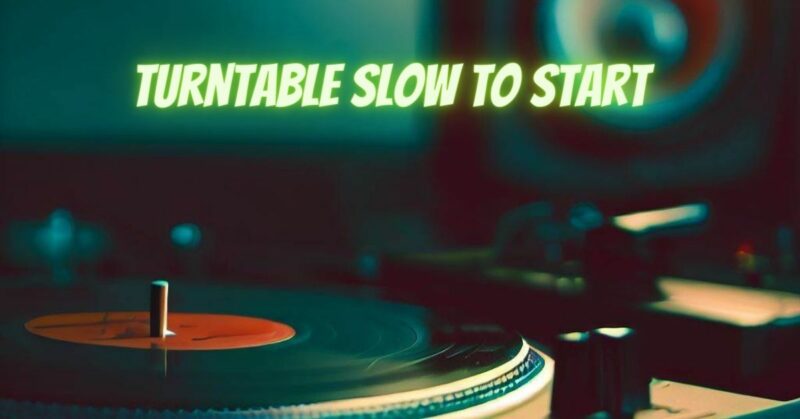Turntables are beloved for their warm sound and vintage appeal, providing a unique and authentic listening experience for music enthusiasts. However, like any mechanical device, turntables can encounter issues over time. One common problem is when a turntable is slow to start or experiences difficulty reaching the correct speed. In this article, we will explore the possible causes of a slow-starting turntable and offer troubleshooting tips to help you address the issue and restore your turntable to optimal performance.
Causes of a Slow-Starting Turntable
- Belt Issues: Many turntables use a belt-drive system to spin the platter. If the belt is worn out, loose, or slipping, it can cause the platter to rotate at a slower speed than intended.
- Motor Problems: The turntable’s motor is responsible for driving the platter’s rotation. If the motor is malfunctioning, has deteriorated, or lacks proper lubrication, it may struggle to achieve the correct speed.
- Power Supply: In some cases, an inadequate or unstable power supply can affect the turntable’s motor performance, causing the platter to start slowly.
- Stylus Drag: If the tonearm’s stylus is misaligned or poorly calibrated, it can create drag on the record’s surface, slowing down the platter’s rotation.
- Mechanical Resistance: Friction or mechanical resistance in the turntable’s moving parts, such as the bearings or pivot points, can cause the platter to start slowly.
Troubleshooting Tips
- Check the Belt: Inspect the belt for signs of wear, stretching, or slipping. If it appears damaged, replace it with a new one. Additionally, ensure that the belt is properly seated on both the motor pulley and the turntable’s platter pulley.
- Motor Maintenance: If the turntable’s motor is accessible, consider lubricating it according to the manufacturer’s recommendations. Avoid using WD-40 or similar lubricants, as they can cause damage to the motor. If the motor is beyond repair, consult a professional technician for a replacement.
- Power Supply: Ensure that the turntable is connected to a stable and appropriate power source. Avoid using power strips or outlets that are already overloaded, as this can affect the motor’s performance.
- Stylus Alignment: Check the tonearm’s stylus alignment using a protractor or alignment tool. Properly aligning the stylus reduces drag and ensures smooth playback.
- Clean and Lubricate Moving Parts: Dust and debris can accumulate in the turntable’s mechanical components, causing resistance and slowing down the platter’s rotation. Clean and lubricate moving parts, such as bearings and pivot points, following the manufacturer’s guidelines.
- Professional Inspection: If the issue persists after attempting these troubleshooting steps, consider seeking assistance from a professional turntable technician. They have the expertise and specialized tools to diagnose and repair complex problems.
A slow-starting turntable can be a frustrating issue for vinyl enthusiasts, hindering their listening experience and potentially causing damage to the records. By understanding the possible causes and following the troubleshooting tips provided in this article, you can effectively identify and resolve the problem. Regular maintenance, proper calibration, and gentle handling of your turntable will not only address slow start issues but also ensure that you continue to enjoy the rich, authentic sound that vinyl records offer for many years to come.


